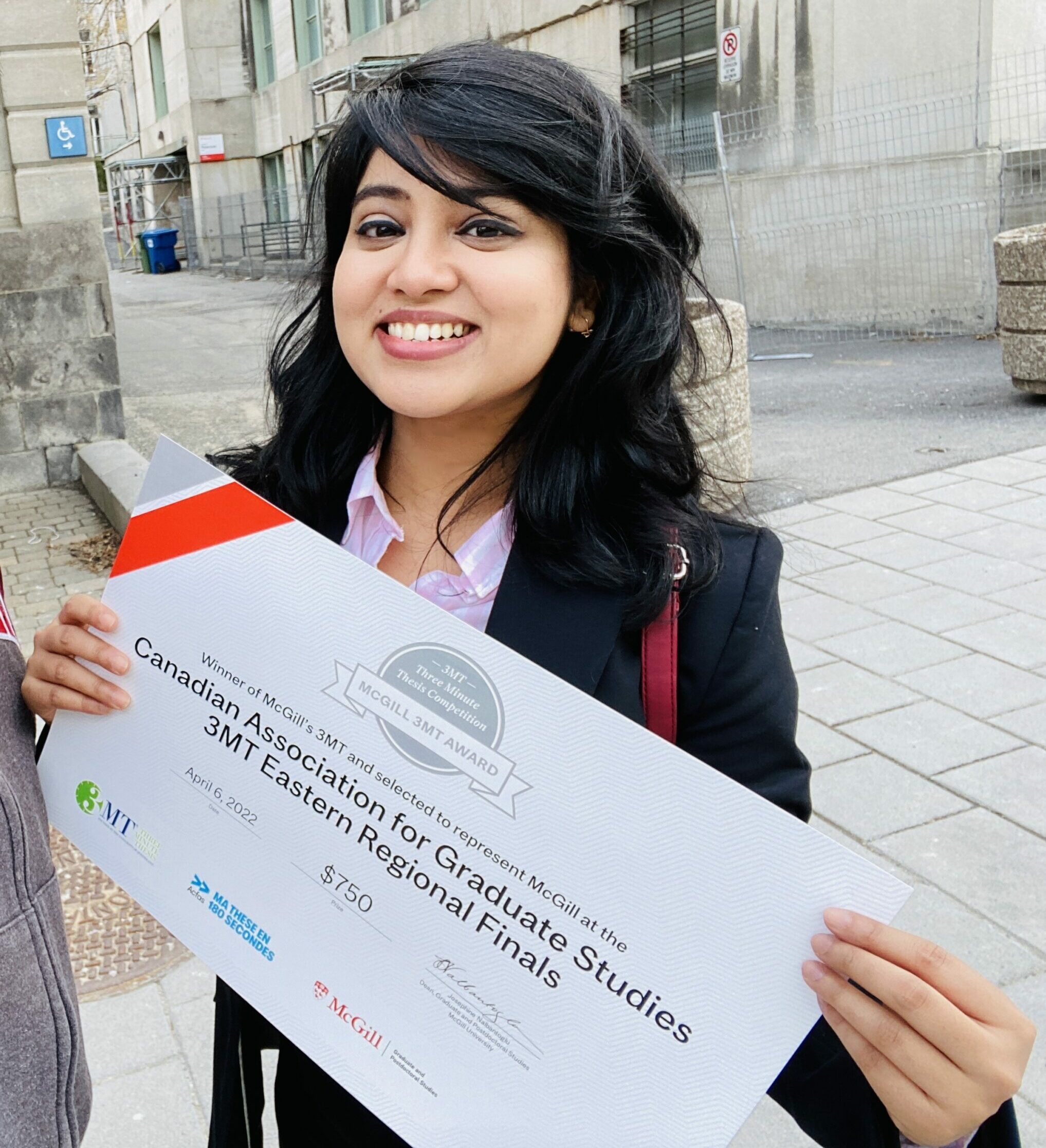
Boiling down years of painstakingly composed graduate work into a lightning-quick three-minute presentation is a daunting task, but Atia Amin, a PhD student in Human Genetics, has become expert at it.
In April, she won top honours at McGill’s Three Minute Thesis (3MT) competition for graduate students. Two months later, she came in first place at the 3MT Eastern Regional Finals, held virtually at the University of New Brunswick.
On November 2, Amin will represent McGill at the national finals at Montreal’s Centre Sheraton as part of the annual conference of the Canadian Association for Graduate Studies (CAGS).
The 3MT competition gives participants just three minutes to explain their scholarly activity in an accessible and engaging way. No props are allowed; students can only use one static slide, and their storytelling abilities.
Since the first 3MT competition took place at the University of Queensland in Australia in 2008, the concept has gone global, with more than 600 universities and research institutions in 65 countries now hosting annual competitions. McGill held its first annual 3MT competition in 2012, organized by SKILLSETS in Teaching and Learning Services, in collaboration with Graduate and Postdoctoral Studies.
Part research, part performance
Originally from Bangladesh, Amin earned a microbiology degree from the University of Dhaka and a master’s degree at the University of South Dakota before arriving at McGill two years ago. Currently, she is interested in interdisciplinary research that bridges the gap between molecular biology and computer science, and her research focuses on finding effective biomarkers for different insect-borne diseases. Her award-winning 3MT presentation is called “Preventing Leishmaniasis Using Exosomes.” Leishmaniasis is a parasitic disease found in parts of the tropics, subtropics and southern Europe. Exosomes are microscopic vesicles secreted from different cell types containing proteins or nucleic acids.
How can that story be told in the time it takes to play the average pop song on the radio?
“As you can imagine, it was very difficult to wrap it up within just three minutes,” Amin said. “In addition to the strict time limit, the most challenging part was to find a balance between not oversimplifying the research approach and not overcomplicating it using scientific jargon.”
Amin overcame her time restrictions by breaking her presentation down into three sections. First, she introduced the problem explaining the bigger picture, and why people should care. Second, she explained her scientific approach very briefly, using non-technical language. And lastly, she emphasized the real-life applications of her findings.
“I surely lose a lot of detail when explaining my research in just three minutes if my audience is a scientific community,” she says. “But when I am pitching to the general non-scientific audience, I think three minute is good enough to frame the important detail while explaining the impact and applicability of my research.”
The competition places an emphasis on communication skills and ability to perform under pressure as much as it does on research, with skills such as public speaking, ability to tell concise stories, and even body language coming into play.
“Every second, every word, every pause counts,” Amin says. “So, yes, even during the presentation I remain cautious about my wording, pausing and overall timing.”
In-person presentation has advantages
This fall’s National 3MT Showcase will feature a total of nine live presentations. Amin will face the winners of the Ontario and Western regional competitions, who will be invited to present live and in-person. She’ll also be up against two additional finalists from each of the three regional competitions – some of whom will be allowed to present virtually.
“The challenges are different based on if it is in-person or virtual,” Amin says. “For in-person competition, I enjoy being able to communicate with the audience directly. I can change my expression, body language and pace of my talk based on the responses I get from the audience which helps me engage with them. But in virtual platform it’s difficult to do so as you don’t see the audience.”

Amazing! Congratulations!
Thank you so much!
Brilliant topic for research for generations. I am pleased to see our girls and boys are doing so well. Congratulations Atia Amin. Nothing is impossible. 3 minutes is huge time for a researcher or scientists. Remember all the ideas for big invetions had come in 30 sec.!!! You have find the paths, so no worries. Just follow the same by incorporating the tyni mistake if any. Finger crossed. Good luck. Thank you for upholding your nation to the globe. Be a lady with the lamp by your outcomes for the humanity. May Allah SWT bless you as always. Ameen. Nazmul… Read more »
Thank you so much for your encouraging comment! 🙂
Thank you very much for your kind message & good wishes, Dr. Nazmul.
That’s great.
I appreciate you that is great
Congratulations Atia!